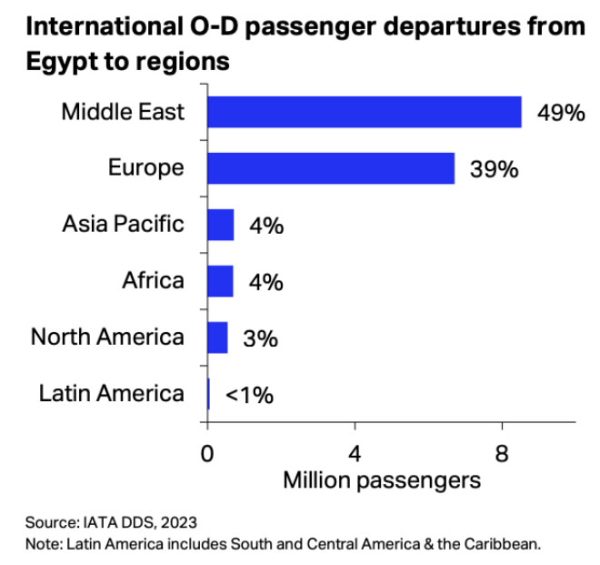SINGAPORE, 29 April 2025: The International Air Transport Association (IATA) has released a study measuring the significant economic and employment benefits aviation (including aviation-related tourism) generates for Egypt.

Standouts based on 2023 figures
- USD 21.1 billion of economic activity equals 5.3% of Egypt’s Gross Domestic Product (GDP) (including wider supply chain, employee spending, and tourism activities).
- 1.4 million jobs (across the supply chain and including tourism), of which 32,800 are directly employed by airlines.
- 338,600 tonnes of air cargo handled.
Access the full study (pdf)
“Aviation is a key contributor to Egypt’s economy. Directly and through its well-developed tourism industry, aviation supports nearly 1.4 million jobs. Over 5% of Egypt’s GDP has close links to aviation,”
said ATA’s Regional Vice-President for Africa and the Middle East, Kamil Alawadhi, following a meeting with Egypt’s Minister of Civil Aviation, Dr Sameh Elhefny.
“Importantly, the Egyptian government is using the aviation sector as a strategic economic and social development enabler. I was encouraged by the Minister of Civil Aviation’s reaffirmation of the government’s commitment to continued close collaboration with IATA to expand aviation’s benefits to Egypt — guided by global standards and best practices across all areas of aviation, including safety, sustainability, cost-efficiency and skills development.”

Key Priorities for Egypt
To continue maximising the benefits of aviation, IATA highlighted three key priorities for Egypt to pursue.
Cost-Efficiency: As Egypt strategically invests in airport infrastructure (Cairo International, Borg El Arab and Sphinx International), IATA urges the government to collaborate with airline users and adhere to global best practices. Such collaboration will avoid unnecessary financial burdens on airlines and passengers.
Sustainability: IATA is encouraged by Egypt’s collaboration with the European Bank for Reconstruction and Development to create the capacity to produce 120,000 tonnes of Sustainable Aviation Fuel (SAF) annually. This supports Egypt’s Vision 2030 and aligns with the global goal of achieving net-zero carbon emissions in aviation by 2050. It is an encouraging step to help Egypt and its aviation sector achieve their common goal of decarbonising aviation.
Capacity-Building: A strong and skilled workforce is critical to growing aviation’s benefits. From technical operations to digital transformation and sustainable practices, a future-ready workforce will strengthen safety, efficiency, and long-term resilience.






